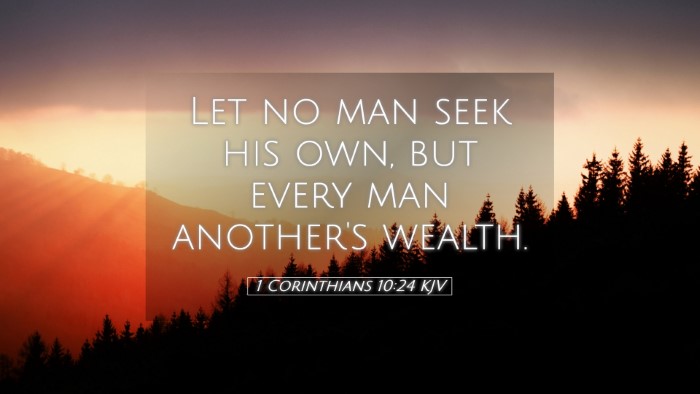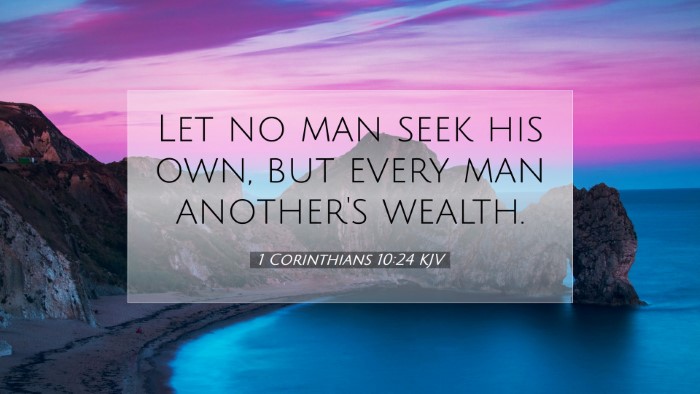Commentary on 1 Corinthians 10:24
Verse: 1 Corinthians 10:24
"Let no man seek his own, but every man another's wealth."
Overview
This verse encapsulates Paul's exhortation to prioritize the welfare of others over personal desires, which is a recurrent theme in his letters. The Apostle emphasizes the importance of community and mutual support within the body of Christ, urging believers to consider the impact of their actions on the spiritual and material wellbeing of fellow believers.
Theological Implications
1 Corinthians 10:24 challenges both individualism and selfishness by promoting an ethos of charity and selflessness. Throughout Scripture, we see that the call to follow Christ includes a transformation in how we regard and treat others. Paul harps on this principle throughout his epistles, especially in the context of communal living and shared faith.
Historical Context
In the context of the Corinthian church, Paul addresses several issues related to personal liberties, idolatry, and social conduct within a diverse and often morally ambiguous society. The Corinthian Christians were grappling with how to maintain their faith while engaging with a culture that operated on very different principles. Paul’s assertion here is directed at guiding their conduct in light of the gospel, which stands counter to the prevailing attitudes of self-interest.
Insights from Public Domain Commentaries
Matthew Henry's Commentary
Matthew Henry emphasizes that this verse serves as a guiding principle for Christian behavior. He notes that selfishness is a natural inclination in humans, but it runs contrary to the teachings of Christ. Henry insists that Christians should not only refrain from causing others to stumble but actively look for ways to promote the good of others. This reflects the essence of love as taught by Jesus.
Albert Barnes' Notes
Albert Barnes elaborates on the interpretation of "another's wealth" as referring not just to material wealth but also to spiritual prosperity. He underscores the idea that each believer's actions can either build up or tear down the faith community. Barnes advises that as believers consider their liberty, they must never lose sight of the impact their choices have on others; hence, the request to seek the welfare of others becomes paramount.
Adam Clarke's Commentary
Adam Clarke delves into the social dynamics of the early church, pointing out that the principles articulated by Paul were particularly revolutionary at that time. Clarke notes that seeking the wealth of others involves a comprehensive understanding of wealth itself, which includes moral, spiritual, and social dimensions. This pursuit should reflect the love of Christ as believers engage with one another, lifting each other up in their walk of faith.
Practical Applications for Today
In contemporary contexts, 1 Corinthians 10:24 offers profound insights for pastoral care, ethical decision-making, and community living among believers:
- Empathy in Ministry: Pastors and leaders should foster an environment that encourages empathy, ensuring that the needs of the congregation are prioritized.
- Collective Responsibility: The passage calls for a collective responsibility among church members that promotes accountability and love for one another.
- Ethical Living: As individuals navigate personal choices, they are urged to consider how those choices affect their communities, emphasizing integrity and love.
- Promotion of Welfare: Initiatives that address both physical and spiritual needs within the church should be championed, demonstrating active love and concern.
Conclusion
1 Corinthians 10:24 serves as a powerful reminder of the Christian calling to prioritize the needs and welfare of others. For pastors, students, and scholars, grappling with the implications of this verse encourages a deeper understanding of community within the body of Christ. The insights provided by the great commentators enrich our appreciation of this scripture and challenge us to embody Christ’s love in practical, actionable ways.


